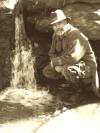| Online: | |
| Visits: | |
| Stories: |

| Story Views | |
| Now: | |
| Last Hour: | |
| Last 24 Hours: | |
| Total: | |
A Curiously Strong One-Stop-Shop for Natural Fire Tinder
by Todd Walker
Nature is an amazing teacher and provider!
Are you familiar with the American Beech tree? They’re easy to identify. Just look for a smooth-barked tree that has initials carved in the trunk. I know I carved mine in their thin, whitish bark as a kid. Beech trees usually grow in groves near water and rich, well-drained soil.
I’ve always noticed black clumps attached to the branches of these trees in winter and early spring when green foliage is absent. Last weekend curiosity got the best of me. I carefully harvested a clump, not sure of what it was, or if these hard black masses would be of use somehow.
Guess what? Turns out that sooty mold makes an excellent fire tinder. You may have already known this, but to me, I was totally tickled by my new discovery!
Before demonstrating its usefulness for outers, bushcrafters, and self-reliant types, here’s how sooty mold is created.
Beginning in the late summer months, the Beech Blight Aphid (BBA) begins gathering in colonies on the branches of the American Beech tree. These little aphids are also known as wooly aphids and “boogie-woogie” aphids due to their defensive dance they perform when disturbed. The entire colony of thousands of white bugs begin to gyrate in unison when they feel threatened. I caught them dancing on a short video last summer while stump shooting. Quite amusing to watch!
So how does the Boogie-Woogie Aphid help create natural fire tinder?
The BBA is drawn to the American Beech tree for its sap. They amass in such large numbers that the limbs look to be covered with snow. While hanging out, they ingest the sap and excrete honeydew which covers Beech branches, twigs, and the ground underneath.
This waste (poop) provides a suitable food source for the next cycle of life – fungi. Sooty molds feed on this sweet, sugary honeydew and eventually turns into a black tar-like mass. The mold doesn’t penetrate the bark and harm the tree. It simply eats the aphid’s sweet poop. Yummy!
During my dirt time last weekend, I had a hunch. Would these black masses burn? This is how we discover new stuff – by being curious.
I harvested a clump from a low tree branch near my shelter.

To my surprise and excitement, the brittle sooty mold took a spark from my ferro rod and began to smolder.
Some gentle blowing and you can create sooty mold on fire!
Unlike punk wood, cattail heads, or cotton fabric, there’s no need to char the sooty mold for it to catch and hold a spark. The black mass already appears charred and has plenty of nooks and crannies for increased surface area to hold sparks off a ferro rod. I have not tested it with flint and steel yet.
This resource-rich tree is loaded with dried leaves well after other deciduous trees are bare. Arrange the dried leaves into a bird’s nest tinder bundle, add smoldering sooty mold, blow, and you have a curiously strong one-stop-shop for fire from the American Beech tree in the eastern woodlands!
Now I’m curious if any of you fellow Doers of Stuff have ever tried sooty mold for fire tinder – or am I just late to the party? Share your best natural fire tinder with us in the comments for some open learning opportunities!
Keep Doing the Stuff,
Todd
P.S. – You can also keep up with the Stuff we’re Doing on Twitter, Pinterest, Google +, and our Facebook page. Ready to trade theory for action? Join us in the Doing the Stuff Network on these social media sites: Pinterest, Google +, and Facebook. Use the hashtag #DoingTheStuff when sharing your stuff on Twitter.
P.P.S – If you find value in our blog, DRG and I would appreciate your vote on the Top Prepper Sites! You can vote daily by clicking here or on the image below. Check out all the other value-adding Prepper sites while you’re there…
Thanks for sharing the stuff!
Copyright Information: Content on this site (unless the work of a third-party) may be shared freely in digital form, in part or whole, for non-commercial use with a link back to this site crediting the author. All links in articles must remain intact as originally posted in order to be republished. If you are interested a third-party article, please contact the author directly for republishing information.
Source: https://survivalsherpa.wordpress.com/2014/04/03/a-curiously-strong-one-stop-shop-for-natural-fire-tinder/









